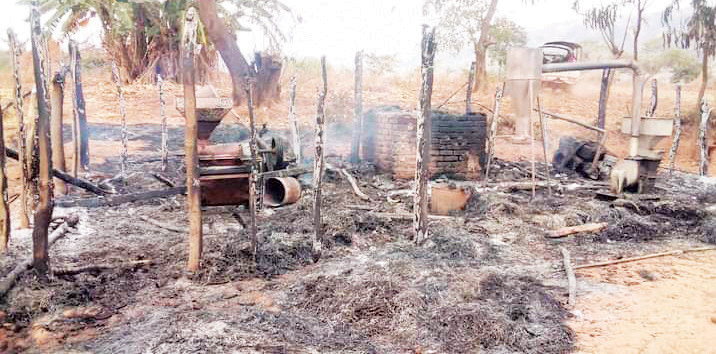Copyright times

By Mercy Matonga: The outskirts of Lilongwe’s Area 25 are not meant for quiet reflection; they are an expanding maze of concrete and ambition. Yet, tucked away in a small compound, a different kind of life unfolds. Here, in the elderly home called Mai Mbambande, laughter and prayer mingle among grey-haired men and women who walk with their eyes to the ground, their bent waists no longer able to hold their heads high. They are Malawi’s forgotten generation, survivors of unimaginable pain. Many were driven from their villages, their homes burned, their children lost; all because their neighbours whispered the word ‘witch’. Now, they rely on the kindness of others and on the love of a single, unexpected guardian 25-year-old Deborah Masina, who believes dignity has no expiry date. This is where the persecuted find peace, where strangers become family and where a young woman answers the haunting question that hangs over Malawi’s most vulnerable: Who will hold us when we are old? Their stories are a testament to the pain and resilience of people once strong enough to raise generations, now relying on the kindness of others to make it through each day. Eighty-five-year-old Zeripha Zagwa of Dzama Village, Lilongwe, exemplifies this struggle. She once had children of her own, but after they passed away, leaving six grandchildren behind, the tone in her village shifted. Since then, many neighbours have looked at her differently, believing she is a witch. “I had a normal life growing up. I had a husband and children. Unfortunately, my husband died eight years ago after being attacked by an alligator. That is when my life changed,” Zagwa says. Rumours spread quickly that she had ‘eaten’ her children. The accusations intensified a few years later when her sister died following a long illness. “My sister was in and out of the hospital. The family turned to traditional medicine, but I asked if we could also visit pastors. Everyone thought I was a witch; they said that was why I was avoiding the traditional healers,” Zagwa recalls. The finger-pointing escalated until one night, as she slept, someone set her house on fire. She survived only because well-wishers rescued her, an ordeal that left deep scars. When the Mai Mbambande home opened nearby, the village chief suggested she move there for safety and support. Zagwa’s experience echoes the stories of many others at the home, including Nasitima Chikadwala, fondly known as Nana. “I never had children of my own, but I helped my siblings raise theirs. My husband, who was a driver, supported me and we lived comfortably. I never complained much,” Nana says. But witchcraft accusations changed everything. The trauma still lingers; she lives in constant fear. Fortunately, she was taken in by the Mai Mbambande Foundation, where she now finds peace and care. The foundation does not only look after women; it also shelters men like Allan Kwenda, who once had it all. “I used to have money. I owned a butchery and was well known in my area. I had two wives, too. “In 1999, both my marriages ended. I thought money was everything and I drank a lot. Eventually, I lost everything, even my business,” Kwenda recalls. He believes that without Mai Mbambande, he might not have survived. “Drinking on an empty stomach, going without food, I could have died if it were not for the counselling and support I get here,” he adds. It is all held together by Masina, the 25-year-old founder who runs Mai Mbambande not for profit, but purely out of love. “I believe caring is in my blood. I left my parents’ house when I was 19, and they trusted I could live on my own because I have always been independent,” she explains. Once a journalist, Masina now balances her time as a full-time farmer and a catering service operator. She supports all 84 elderly men and women almost entirely on her own, relying only on her businesses and the generosity of occasional well-wishers, without any stable funding. “These people are so fragile that they are old and need both medical and mental support, and medical support now and then, and with the distance to the hospital right now, it is not easy, especially when they fall sick,” Masina says. Masina points out that the accusations are often rooted in misunderstanding: elderly people suffering from dementia are tragically mistaken for witches when they struggle to remember things. She stresses the need for people to educate themselves about the aging process. In a society where growing old often means growing invisible, her work stands as a reminder that dignity has no expiry date and that perhaps the measure of humanity lies in how we hold those who once held us. The threat to the elderly is profound. According to Steve Vinkhumbo, Chief Elderly Affairs Officer in the Ministry of Gender, 24 elderly people were murdered in 2024 alone, most after being accused of witchcraft. Shockingly, 21 of those victims were women. “As a government, we are putting several interventions in place, including upgrading our laws to ensure that the rights of elderly people are protected and that they feel safe in their communities,” Vinkhumbo says. The brutal reality Vinkhumbo shared, of elders being murdered in their own communities, is a chilling reminder of the work that remains. Yet, in the dedication of Masina, there is a powerful answer to the darkness. In the meantime, it is clear the elderly are finding some comfort at Mai Mbambande, not just by living within some walls or thin mattresses, but in the presence of another human being; someone simply willing to reach out a hand.



